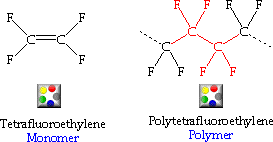Polymers
The world is full of molecules with very large molecular weights. Examples range from high molecular weight hydrocarbons in coal and crude oil to the highly specialised biological molecules such as enzymes, proteins and DNA. Large molecules (macromolecules) made up of smaller repeating units are called polymers, a term first used by Berzelius in 1830. Polymer molecular weights can range from the thousands - to millions. The small "building" molecules are known as monomers, for example, one of the most industrially important polymers, polyterafluoroethylene (Teflon), is made from the tetrafluoroethylene monomer:


